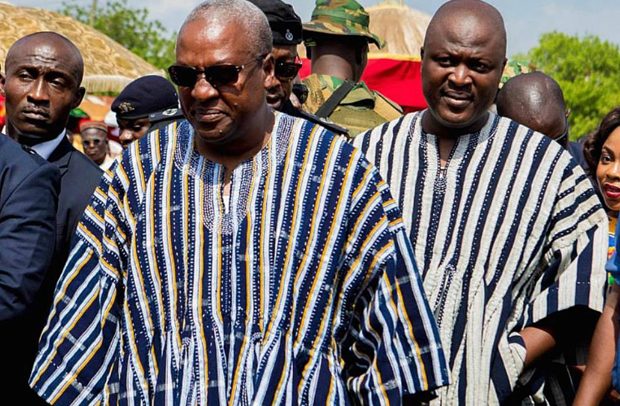It is turning out that one of the main reasons why former President John Dramani Mahama does not appear to ‘gel’ with President Akufo-Addo and his administration is because of the bauxite concession that the NPP government took from the NDC leader’s brother, Ibrahim Mahama, in 2017.
There are unconfirmed claims that the former President has said before he will let his NDC cooperate with the Akufo-Addo administration, especially in Parliament, the Nyinahin Bauxite concession in the Ashanti Region that his NDC administration controversially gave to a company called Exton Cubic, linked to his junior brother, be returned.
Deep throat sources have hinted DAILY GUIDE that somewhere in February when the ministers were preparing to be vetted, President Akufo-Addo allegedly met the Speaker of Parliament, Alban Bagbin, to discuss how the Executive arm of government can work together in consensus building with the Legislature, for the good of the country considering the closeness nature of Parliament, with no clear majority from either the governing NPP or the opposition NDC.
But considering the suspicion with which some NDC members looked at Speaker Bagbin since he is from their stock, he was said to have thought it wise to inform the former President and asked if there were any issues or concerns he might want him to raise with the President for him to address, ahead of the said meeting.
That was when the ex-President’s team told Mr. Bagbin’s team to ask President Akufo-Addo to restore his businessman brother, Ibrahim’s bauxite concession at Nyinahin in the Atwima Mponua area, to him before any talk of cooperation would be done.
Exton Cubic
The much-talked-about multi-billion long lease bauxite concession was granted to Exton Cubic at the tail end of Mr. Mahama’s presidency on December 29, 2016 when the NDC had lost the December 7, 2016 general election miserably and was on its way out of office.
The company in early 2017 moved heavy-duty machines into the forest near Nyinahin in the Atwima Mponua District to start exploratory activities but was stopped by both the district and regional authorities, compelling Exton Cubic to go to court to challenge the action of the authorities.
There were projections that about 75 per cent of Ghana’s bauxite deposits estimated about $180 billion were handed over to the former President’s brother’s company, and it was the same concession that has since been used as part of the bauxite deposit collateral for a barter deal with Chinese company Synohydro to secure a $2 billion facility by the government.
Court Pronouncements
The Supreme Court in January 2020 subsequently dismissed an application by Ibrahim Mahama’s company over the controversial Nyinahin Bauxite concession.
The application was seeking a review of the decision of a five-member panel of the court to quash the ruling of an Accra High Court judge, Justice Ackah-Boafo, which was given in 2019 in favour of Ibrahim, when the high court held that then Lands and Forestry Minister, John Peter Amewu, erred in cancelling Ibrahim’s lease.
The Supreme Court on July 31, 2019, in a unanimous decision, declared that three mining leases granted Ibrahim’s company, Exton Cubic Group Limited, were null and void due to the fact that proper procedures were not followed in securing the leases.
This was after the Office of the Attorney General had gone before the Supreme Court to challenge the high court ruling, which it said was protecting a non-existing right.
The five-member panel made up of Justices Julius Ansah, Jones Victor Dotse, K. Anin-Yeboah, Samuel K. Marful-Sau and Prof. Emmanuel Nii Ashie Kotey had held that in accordance with Article 257, all minerals belonged to the people of Ghana and that the President held same in trust for the people, which was why Article 268 enjoined all mining leases to obtain parliamentary ratification.
The court also quashed the ruling of Justice Ackah-Boafo, which was given last year in favour of Ibrahim.
The Supreme Court said the high court judge had no jurisdiction to grant certiorari to protect a non-existent right, and warned the lower courts to be careful in issuing orders of certiorari to protect rights which did not exist in law.
Ibrahim’s Review
Exton Cubic later filed an application for review against the Supreme Court’s decision which was supposed to have brought finality to the matter.
In the application, Ibrahim’s company averred that the five-member panel committed an error when it went ahead to quash the decision of an Accra High Court, which was in favour of the company.
Osafo Buabeng, lawyer for Exton Cubic, had argued that the issue which went before the high court judge was a review of a procedural impropriety and did not concern the merits of the decision of the minister, but rather whether the minister complied with Section 68 of the Minerals Act (Act 703).
He had insisted that the Supreme Court committed an error which resulted in a special circumstance under which they could seek a review, and said the Supreme Court could only enforce the constitution when its original jurisdiction was invoked and not when its supervisory jurisdiction was invoked as was done in this case.
AG’s Push
Then Deputy Attorney General, Godfred Yeboah Dame, who is now the Attorney General, pushed back and said Exton Cubic’s applicant did not show any special circumstances as provided by the Supreme Court rules for seeking a review.
He had argued that the application was just a rehash of the submissions made in opposition to the AG’s application, which led to the quashing of the high court ruling.
The Supreme Court, in a majority decision of 5-2, dismissed the application with Chief Justice Anin-Yeboah, Justices Julius Ansah, Jones Dotse Marful-Sau and Prof. Nii Ashie Kotey dismissing it, while Justices Yaw Apau and Gabriel Pwamang dissented.
By Charles Takyi-Boadu


